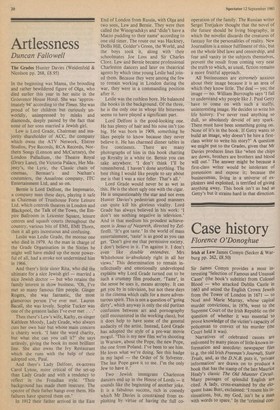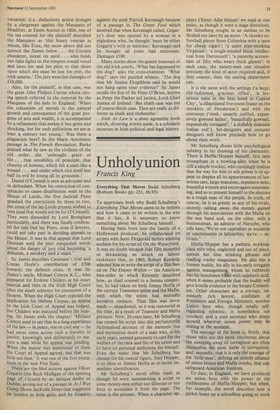Case history
Florence O'Donoghue
Irish at Law James Comyn (Secker & Warburg pp. 262, £8.50) Sir James Comyn provides a most interesting 'Selection of Famous and Unusual Cases' (the book's subtitle) from Colonel Blood — who attacked Dublin Castle in 1663 and seized the English Crown Jewels from the Tower of London in 1671 — to Noel and Marie Murray, whose capital murder convictions, in 1976, went to the Supreme Court of the Irish Republic on the question of whether it was essential to prove knowledge of the victim's capacity of policeman to convict of his murder (the Court held it was).
Narratives of celebrated causes are enlivened by many pieces of little-known information and anecdote: newspaper files (e.g. the old Irish Freeman's Journal), State Trials, and, as the D.N.B. puts it, 'private information' are drawn on to produce a book that has the stamp of the late Maurice Healy's classic The Old Munster Circuit. Many passages of splendid English are cited. A lady, cross-examined by the eloquent Isaac Butt, exclaimed: 'I resent his insinuations, but, my God, isn't he a man with words to spare.' In the 'criminal con versation' (i.e. deduction) action brought by a clergyman against the Marquess of Headfort, at Ennis Assizes in 1804, one of the ten counsel for the plaintiff described the Marquess as 'this hoary veteran in whom, like Etna, the snow above did not quench the flames below . . . the Cornish plunderer, intent on spoil . . . who holds out false lights to the tempest-tossed vessel and lures her and her pilot to that shore Upon which she must be lost for ever, the rock unseen.' The jury awarded damages of £10,000.
Also, for the plaintiff, in that case, was the great John Philpot Curran whose closing speech referred to the removal by the Marquess of the lady to England: 'When the relaxation of morals is the natural growth and consequence of the great progress of arts and wealth, it is accompanied by a refinement that makes it less gross and shocking, but for such palliations we are at least a century too young.' Was there a plagiarism here? In the Marie Antoinette Passage in The French Revolution, Burke Praised what he saw as the civilities of the old order: the `unbought grace of life . . . that sensibility of principle, that chastity of honour, which felt a stain like a wound . . . and under which vice itself lost half its evil by losing all its grossness.'
Daniel O'Connell is seen as advocate and as defendant. When his conviction of conspiracies to cause disaffection went to the House of Lords, the five Judicial Peers quashed the convictions by three to two, but some of the lay Lords present wished to vote (and that would not be for O'Connell). They were dissuaded by Lord Brougham particularly, and there was finally confirmed the rule that lay Peers, even if lawyers, could not take part in deciding appeals to the House. It was in that appeal that Lord Denman used the later misquoted words about the danger of jury trial becoming 'a delusion, a mockery and a snare.'
Sir James describes Casement's trial and Conan Doyle's contribution of £700 towards the defence costs. It was Sir James's uncle, Michael Comyn K.C., who appeared for Erskine Childers at his court martial and then in the Irish High Court after the death sentence for possession of a firearm. When the High Court rejected the application for Habeas Corpus, an appeal to the Irish Court of Appeal was lodged, but Childers was executed before the hearing. Sir James ends the chapter: 'Michael Comyn used to say that in a long experience of the law — in peace, war or civil war — he had never come across such a travesty of justice, knowingly and deliberately to execute a man while his appeal was pending. When the matter was mentioned to them the Court of Appeal agreed, but that was little use then.' It was one of the first executions in the new Free State.
There are the libel actions against Oliver Gogarty (the Buck Mulligan of the opening Page of Ulysses) by an antique dealer of Dublin, arising out of a passage in As I Was Going Down Sackville Street that suggested an interest in little girls; and by Gogarty against the poet Patrick Kavanagh because of a passage in The Green Fool which asserted that when Kavanagh called, Gogarty's door was opened by a woman in a nightdress who, he thought 'must be either Gogarty's wife or mistress.' Kavanagh said he thought all poets had mistresses. Damages £100.
Many stories show the quaint humours of the old Irish courts. 'What has happened to the dog?' asks the cross-examiner. 'What dog?' says the puzzled witness. 'The dog that Mr Justice Fitzgibbon said he would not hang upon your evidence!' Sir James recalls the lisp of Sir Peter O'Brien, known as Peter the Packer (of juries), Lord Chief Justice of Ireland: 'But thath case was not of course thitsh case. They are really as different as thalk and thcheesthe.'
Irish At Law is a most agreeable book which, diverting stories aside, is a scholarly excursus in Irish political and legal history.

































 Previous page
Previous page